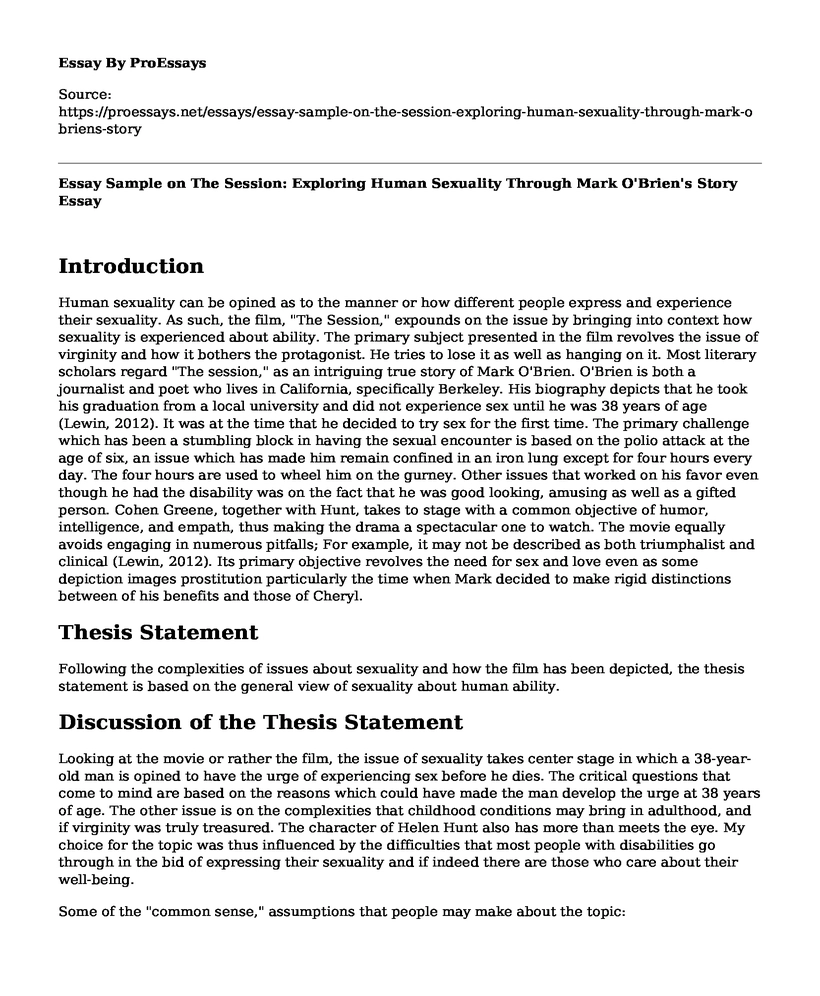Introduction
Human sexuality can be opined as to the manner or how different people express and experience their sexuality. As such, the film, "The Session," expounds on the issue by bringing into context how sexuality is experienced about ability. The primary subject presented in the film revolves the issue of virginity and how it bothers the protagonist. He tries to lose it as well as hanging on it. Most literary scholars regard "The session," as an intriguing true story of Mark O'Brien. O'Brien is both a journalist and poet who lives in California, specifically Berkeley. His biography depicts that he took his graduation from a local university and did not experience sex until he was 38 years of age (Lewin, 2012). It was at the time that he decided to try sex for the first time. The primary challenge which has been a stumbling block in having the sexual encounter is based on the polio attack at the age of six, an issue which has made him remain confined in an iron lung except for four hours every day. The four hours are used to wheel him on the gurney. Other issues that worked on his favor even though he had the disability was on the fact that he was good looking, amusing as well as a gifted person. Cohen Greene, together with Hunt, takes to stage with a common objective of humor, intelligence, and empath, thus making the drama a spectacular one to watch. The movie equally avoids engaging in numerous pitfalls; For example, it may not be described as both triumphalist and clinical (Lewin, 2012). Its primary objective revolves the need for sex and love even as some depiction images prostitution particularly the time when Mark decided to make rigid distinctions between of his benefits and those of Cheryl.
Thesis Statement
Following the complexities of issues about sexuality and how the film has been depicted, the thesis statement is based on the general view of sexuality about human ability.
Discussion of the Thesis Statement
Looking at the movie or rather the film, the issue of sexuality takes center stage in which a 38-year-old man is opined to have the urge of experiencing sex before he dies. The critical questions that come to mind are based on the reasons which could have made the man develop the urge at 38 years of age. The other issue is on the complexities that childhood conditions may bring in adulthood, and if virginity was truly treasured. The character of Helen Hunt also has more than meets the eye. My choice for the topic was thus influenced by the difficulties that most people with disabilities go through in the bid of expressing their sexuality and if indeed there are those who care about their well-being.
Some of the "common sense," assumptions that people may make about the topic:
- The first assumption is that the expression of sexuality should not be denied to people with disability
- The other issue is the topic being a replica of the movie, "The Session," since it tends to borrow most of the ideas in advancing the topic.
- The third issue is based on disability is a primary mitigating factor in the expression of human sexuality.
Exploration of the Topic with the Use of an Academic Source
The academic source is on the psychology of human sexuality. It opines sexuality as the primary drive behind a person's feelings, behaviors, and thoughts. It equally defines the sociological and psychological description of the self and the process of biological reproduction. As such, the topic has been explored based on the uniqueness that comes with the ability in sexuality.
To some extent, we may argue that extreme disability limits the ability of a person to achieve sexuality. Certain underlying issues accompany the expression of human sexuality. Such includes emotions, seeking of pleasure, and exchange of intimacy (Lucas & Fox, 2019). Unfortunately, it is needed that both the involved sexual partners make a mutual contribution to any successful sexual expression. Therefore, those with a disability may find the achievement of such objectives unattainable due to certain limitations which their conditions may not aid in achieving. The film has also imaged the protagonist in a dimension that validates this concept. At the age of 38, he had not lost his virginity, not because of self-will but because of his disability (Lucas & Fox, 2019). He desired to lose it until an intervention came his way, something which may also appear somewhat embarrassing.
Conclusion
The topic of human sexuality is one that is mostly dodged by people, but how the film and the external academic source has advanced the discussion makes us realize that it is true that ability is also an important discussion to human sexuality. My opinions have thus been shaped that a person's ability may be a mitigating factor when it comes to sexual expression, and the effects are both emotional and psychological as noted herein.
References
Lewin, B., (2012). The Sessions. Retrieved from https://www.imdb.com/title/tt1866249/
Lucas, D. & Fox, J (2019). The Psychology of Human Sexuality. Northwest Vista College. NOBA. Retrieved from https://nobaproject.com/modules/the-psychology-of-human-sexuality
Cite this page
Essay Sample on The Session: Exploring Human Sexuality Through Mark O'Brien's Story. (2023, Jan 24). Retrieved from https://proessays.net/essays/essay-sample-on-the-session-exploring-human-sexuality-through-mark-obriens-story
If you are the original author of this essay and no longer wish to have it published on the ProEssays website, please click below to request its removal:
- Literary Essay Sample: Analysis of Advice to a Discarded Lover
- Translation Analysis of "A Young Man Loves a Maiden" by Heinrich Heine
- Essay on Charlotte Perkins Gilman's the Yellow Wallpaper
- William Carlos Poem Analysis Paper Example
- Essay Sample on Brooklyn Bridge Inspires Poetry: Mayakovsky & Hart Crane
- Critical Essay Sample on "I Felt a Funeral, in my Brain": Emily Dickinson's Unique Style
- Essay on the Beautiful Things that Heaven Bears: Exploring Race and Class in America







